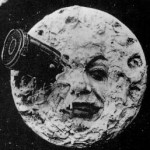TO THE MOON!
By:
May 1, 2009

FREELANCERS, GIVE UP your paltry hopes of making a killing by cooking up a killer iPhone app. The Google Lunar X Prize — $30 million to the first private enterprise that lands a rover on the Moon — is just lying there waiting to be claimed. It’s time to boot up Moon 2.0!
Gawk at the team of attractive yuppies in their sexy start-up office running a lunar mission totally from their iPhones! Check out the crowds of hopeful humans of every race and creed cheering them on! Chuckle as the plucky rover with WALL-E eyes discovers the site of the first Apollo landing!
Moon 2.0 is right in suggesting that the first lunar program failed. In retrospect, Apollo looks likes a breathtaking clusterfuck of bureaucracy applied to the energies of discovery. The Google Lunar X Prize, by contrast, channels the intuition of authors from C. S. Lewis to Robert Heinlein who envisioned space travel as the work not of governments, but of wild-eyed master builders out of Ayn Rand’s wet dreams. But it’s worth mentioning that “Moon 1.0” also may have failed because the Moon turned out to be a desolate rock with nothing to recommend it. Oh, it’s fabulous for howling at and for regulating the tides; it makes a marvelous divinity, and has furnished the Earth with limitless spectacle for more than four billion years. But is the Moon the key to solving global warming? On the way to answering that question, untold carbon credits surely will be expended by well-capitalized X Prize competitors jetting between TED and Davos.
Since the Google Lunar X Prize was announced in 2007, one venture, Odyssey Moon of San Jose, CA, has completed registration. Among other projects, they hope to land a mini-greenhouse on the Moon. That’s a long way from the febrile designs suggested in the Moon 2.0 video, like mining lunar silicon to make solar panels. But hang on — is the Moon really humanity’s last desperate hope for silicon? Besides the Sahara, the Negev, and The Empty Quarter, I mean. Ultimately, of course, the Moon might be the best home for all the server farms Google will need once we’re all living on Google Earth 2.0.
